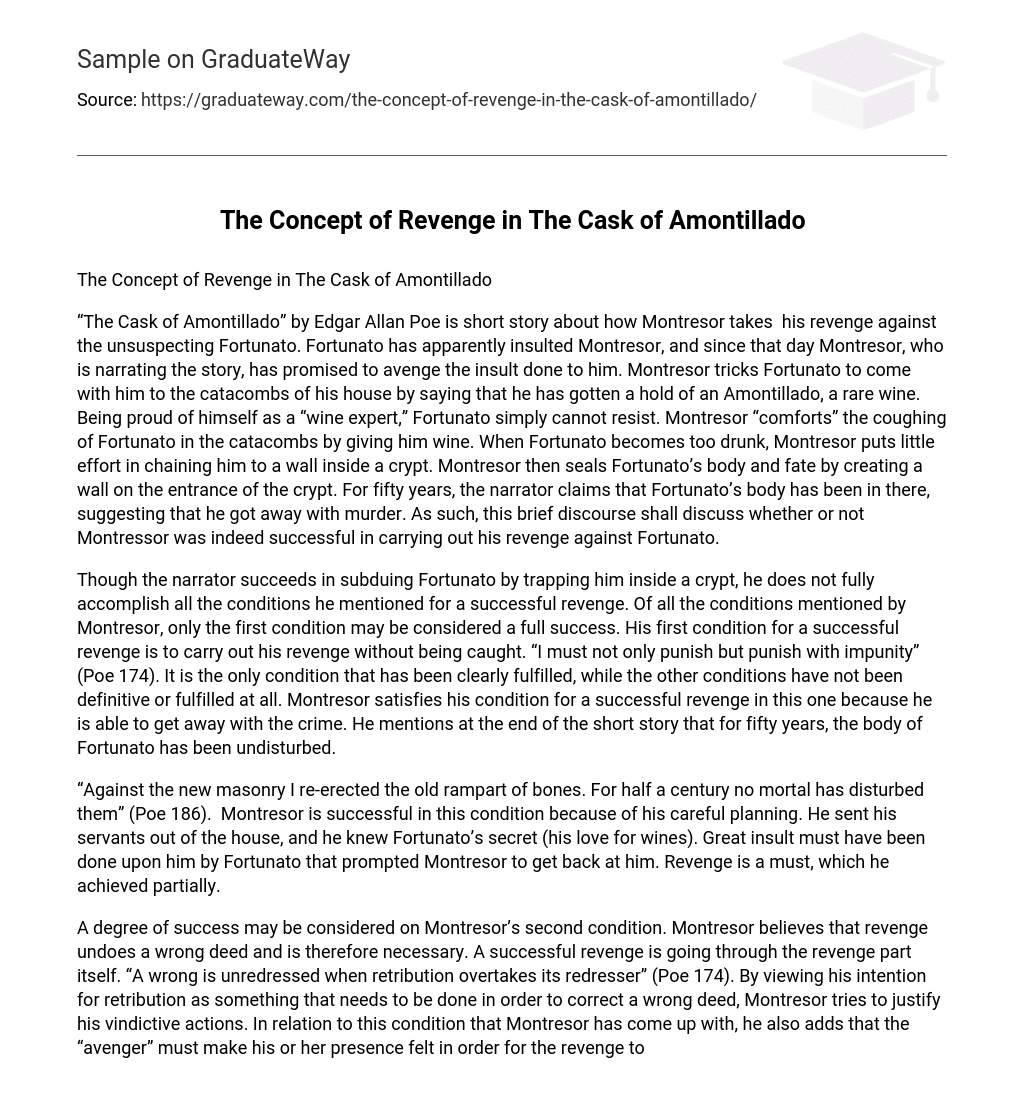“The Cask of Amontillado” by Edgar Allan Poe is short story about how Montresor takes his revenge against the unsuspecting Fortunato. Fortunato has apparently insulted Montresor, and since that day Montresor, who is narrating the story, has promised to avenge the insult done to him. Montresor tricks Fortunato to come with him to the catacombs of his house by saying that he has gotten a hold of an Amontillado, a rare wine. Being proud of himself as a “wine expert,” Fortunato simply cannot resist. Montresor “comforts” the coughing of Fortunato in the catacombs by giving him wine. When Fortunato becomes too drunk, Montresor puts little effort in chaining him to a wall inside a crypt. Montresor then seals Fortunato’s body and fate by creating a wall on the entrance of the crypt. For fifty years, the narrator claims that Fortunato’s body has been in there, suggesting that he got away with murder. As such, this brief discourse shall discuss whether or not Montressor was indeed successful in carrying out his revenge against Fortunato.
Though the narrator succeeds in subduing Fortunato by trapping him inside a crypt, he does not fully accomplish all the conditions he mentioned for a successful revenge. Of all the conditions mentioned by Montresor, only the first condition may be considered a full success. His first condition for a successful revenge is to carry out his revenge without being caught. “I must not only punish but punish with impunity” (Poe 174). It is the only condition that has been clearly fulfilled, while the other conditions have not been definitive or fulfilled at all. Montresor satisfies his condition for a successful revenge in this one because he is able to get away with the crime. He mentions at the end of the short story that for fifty years, the body of Fortunato has been undisturbed.
“Against the new masonry I re-erected the old rampart of bones. For half a century no mortal has disturbed them” (Poe 186). Montresor is successful in this condition because of his careful planning. He sent his servants out of the house, and he knew Fortunato’s secret (his love for wines). Great insult must have been done upon him by Fortunato that prompted Montresor to get back at him. Revenge is a must, which he achieved partially.
A degree of success may be considered on Montresor’s second condition. Montresor believes that revenge undoes a wrong deed and is therefore necessary. A successful revenge is going through the revenge part itself. “A wrong is unredressed when retribution overtakes its redresser” (Poe 174). By viewing his intention for retribution as something that needs to be done in order to correct a wrong deed, Montresor tries to justify his vindictive actions. In relation to this condition that Montresor has come up with, he also adds that the “avenger” must make his or her presence felt in order for the revenge to be successful. “It is equally unredressed when the avenger fails to make himself felt as such to him who has done the wrong” (Poe 174). Montresor almost had his revenge perfectly executed but he failed in gaining full satisfaction over his revenge.
Montresor enumerated his conditions for a successful revenge; first is to get away with the crime, which he did; second is the act of avenging itself; third is to make the revenge as hard as the act that prompted the vengeance; and lastly, the avenger should not be obvious in his or her attempts. One out of the three major conditions is not enough to conclude Montresor’s revenge as successful. Though he did succeed in killing Fortunato, the results show that he did not have a successful revenge. He laid out the criteria for a successful hit, if he had not done so, the readers could have settled with him just killing Fortunato.





